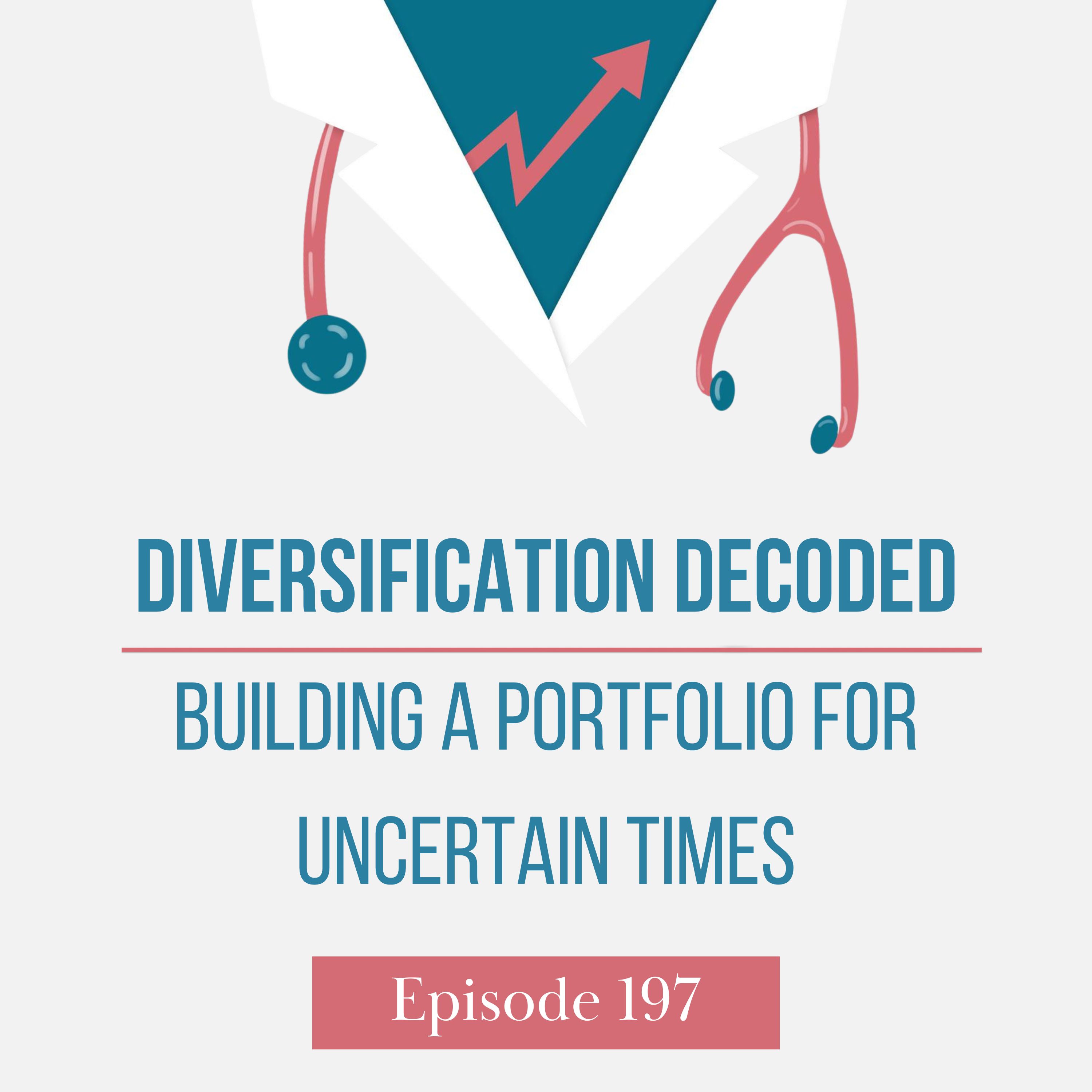Speaker 1 00:00:08 What's up, everyone. Welcome to the finance for physicians podcast. I'm your host, Daniel Raimi. Join me as we dig into what it looks like for physicians to begin using their finances as a tool to live better lives. You can learn more about our
[email protected] let's. Jump into today's episode. Hey, what's up guys. I wanted to talk a little bit retirement plans today. Uh, this, this is a, uh, it's going to be something this'll be a conversation. I think that will be most beneficial for those of you that are employed, particularly if you work for a hospital system or, or even planned to work for one in the future. So what we're going to talk about is how the different retirement plans works collectively. And particularly if you have access to a 4 57 B plan. So we're going to talk about how that interacts with like 401ks or 4 0 3 BS.
Speaker 1 00:01:04 A lot of these hospitals offer all of those plans. And so I think it's important to understand like how they interact with each other and start to kind of figure out the best route to, to navigate this. Okay, so 401k 4 0 3 B and 4 57, as I mentioned, a lot of hospitals offer two of those. A lot of times they'll offer a 4 57 B and a 4 0 3 B or a 4 57 B and a 401k. And every once in a while, they have all three of them. So first thing to understand is the, the limits with these many of you, once you get into practice, you're going to be trying to max everything out, which is, is a good thing like to max out these tax shelters. So, so first thing is the maximum for the employee for the 401k. It kind of like overlaps with the 4 0 3 B.
Speaker 1 00:02:03 So there's only one maximum for those two accounts. So in other words, you, so the current max, so as of 2022 is 20,500 per year. So you can put in up to, as an employee up to 20,500 per year into a 4 0 3 B slash 401k, like the combined of the two. And you can't put in any more than that. So 20,500 is the cap. So that's important to understand that's a combined limit for both 401k and 4 0 3 B. Now there is a, there is an exception for some of these plans that have required mandatory contributions. So check with your plan provider, if this is your situation, but a lot of these plans have mandatory or required contributions to the retirement plan. So in, in many cases, that contribution, although it technically is you as an employee contributing, it's not considered as part of that employee contribution because that 20,500 limit I was talking about is a voluntary it's like you chose to put it in.
Speaker 1 00:03:21 So if it's a mandatory contribution, you technically are not choosing anything, it's a required thing. So that can, if that's the case, you have that mandatory required contribution, oftentimes that will not go into that 20,500 limit. I was just talking about. So, you know, in other words, you could put in 20,500 into your 401k slash four, three B and separately, have that mandatory contribution and still not be over any limits. So then there's the 4 57 B. So with the 4 57 B, that plan has a completely separate limit. That's the most important thing to take away? The 4 57 B has a completely separate limits. So going back to the scenario, I just talked about, if you have that 400, three B say, and it has a, you can put in 20,500 of your own employee contributions, and maybe you have a mandatory contribution that does not count towards that.
Speaker 1 00:04:29 So that's separate. Um, and then maybe you have a 4 57 B plan as well. So in that case, you can put in another 20,500 and max that out. So that's a completely separate limit that is, uh, does not count against the other limits. And, um, and that, you know, that that's important to understand because a lot of people don't realize that and they think that they've maxed everything out. But in reality, you still potentially have that option while we're talking about 4 57 B plans. One of the biggest things with those is understanding if it's a governmental or a non-governmental 4 57 B plan for the sake of simplicity, like if it's a 4 57 governmental plan, it's basically going to be very similar to a normal 401k or 4 0 3 B it's actually slightly more flexible than a 401k or 4 0 3 B. Uh, so ideally it's a governmental plan and that's a really good thing.
Speaker 1 00:05:33 And probably going to make sense to fund that type of plan for people that want to max out tax shelters. On the other hand, if it's a non-governmental 4 57 B plan, that's not near as appealing as the governmental 4 57. Uh, the reason is because so the 4 57 non-governmental plan, first of all, it is going to be technically the hospital or company providing it. It's technically going to be their asset and they'll have a plan to promise to pay you. So it's, you eventually get the benefits, but like the way it works is the company, the hospital owns the asset and then has the responsibility to pay you the balance. So the problem with that is if they get, they go bankrupt or something and have people, creditors are trying to go after them, that balance is subject to the hospital's creditors. So in other words, you could lose all the money due to stuff your hospital did.
Speaker 1 00:06:40 So that's definitely not a good thing. Um, you know, especially if your hospitals going out of business or whatever. Um, so if there's any doubt about the financial viability of your employer, then that's a definite plan to stay away from. Um, and even if you're confident in their finances, it's just a risk there to think about the second big downside of the, uh, of the non-governmental 4 57 is they typically have much more limited options for like leaving employment or retiring. So like a 4 0 3 B or 4 57, or I'm sorry, a 4 0 3 B or a 401k. If you leave work, most of the time, you can roll it over to your new 401k or roll it over to an IRA or something like that. So it's pretty flexible and it stays the, you can kind of preserve it and keep it growing and not be forced to take the money out 4 57.
Speaker 1 00:07:41 Non-governmental typically you can't do that. Well, you can never roll it to an IRA, uh, and you can never roll it into a governmental 4 57 plan. And the only way you can roll it over typically is into a nother non-governmental plan. And then the options for a lot of these 4 57 non-governmental plans have very rigid, forced withdrawals if you leave. So worst case scenario would be like, the plan says, you have to liquidate everything if you terminate employment early. So that's where you need to check out your plan and see what it says, but say you build up money in this 4 57 non-governmental plan, and then you job doesn't work out or you leave after 10 years or something, and you have several hundred thousand dollars in there. And then you go take a new job, keep making the same income problem with that is if this less, if this inflexible plan forces you to take all 200,000 out all at once, that's taxable income on top of what you're already making, which is like, kind of like a tax bomb at the higher, it's going to be the highest tax bracket or, you know, at your highest tax bracket.
Speaker 1 00:08:52 Uh, so it can create that like, you know, not so great tax situation where they're forcing you to take the funds out. And so it's much, it's, it's always less flexible, but like your plan will spell out exactly how those options work. So main things, if you have that 4 57 plan to look out for are whether or not it's governmental. So it's either non-governmental or governmental, and you want to, ideally it's governmental, governmental is, are much more flexible and they basically are very similar to a 401k or 4 0 3 B, but they're slightly more flexible or is your planning non-governmental, which is very inflexible. So if it's a non-governmental big, big considerations are subject to your company's creditors and typically very inflexible. So I would, if you thinking about, or are already funding that it'd be really good to understand what those options are, especially if you are terminating employment and kind of what that looks like.
Speaker 1 00:09:59 Okay. So that's all I got today. Quick, want to do a quick, uh, episode, uh, for you guys. So we'll, uh, hopefully look forward to getting into some, some additional tax related topics and investing topics in the future. But if there's other areas in, in relation to benefits and retirement plans like this, give me a holler, let me know. And we'll definitely be happy to cover that in the future. Look forward to talking to you next time as always, thank you so much for joining us today. If you found this valuable, please give us a review on iTunes and share with a friend. Also check out our
[email protected] for all sorts of additional content. See you next time. Finance for positions is not an investment tax legal or financial advisor. All content included in this podcast is for informational purposes only, and should not be considered financial tax or legal advice. Material presented is believed to be from reliable sources and no representations are made by finance for physicians as to another party's informational accuracy or completeness, all information or ideas provided should be discussed in detail with an advisor accountant or legal counsel prior to implementation. You don't have an advisor or like a second opinion. Feel free to check out our website for recommended advisors.


